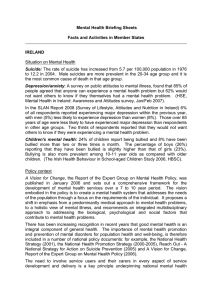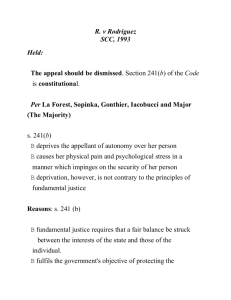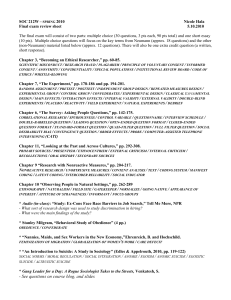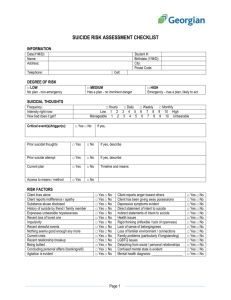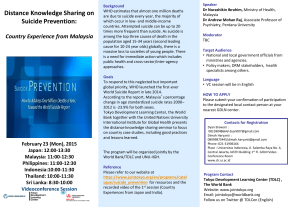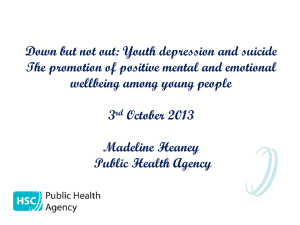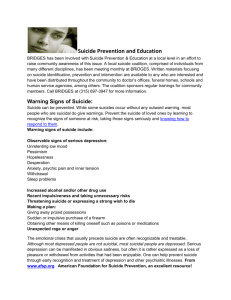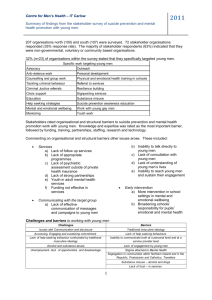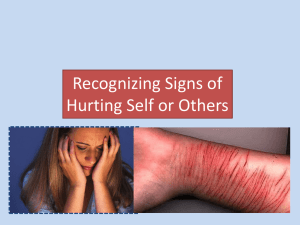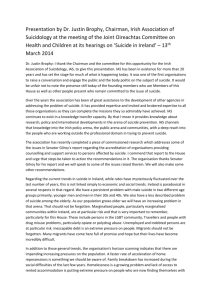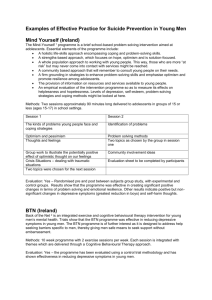Aware Presentation to Joint Committee on Health and Children
advertisement
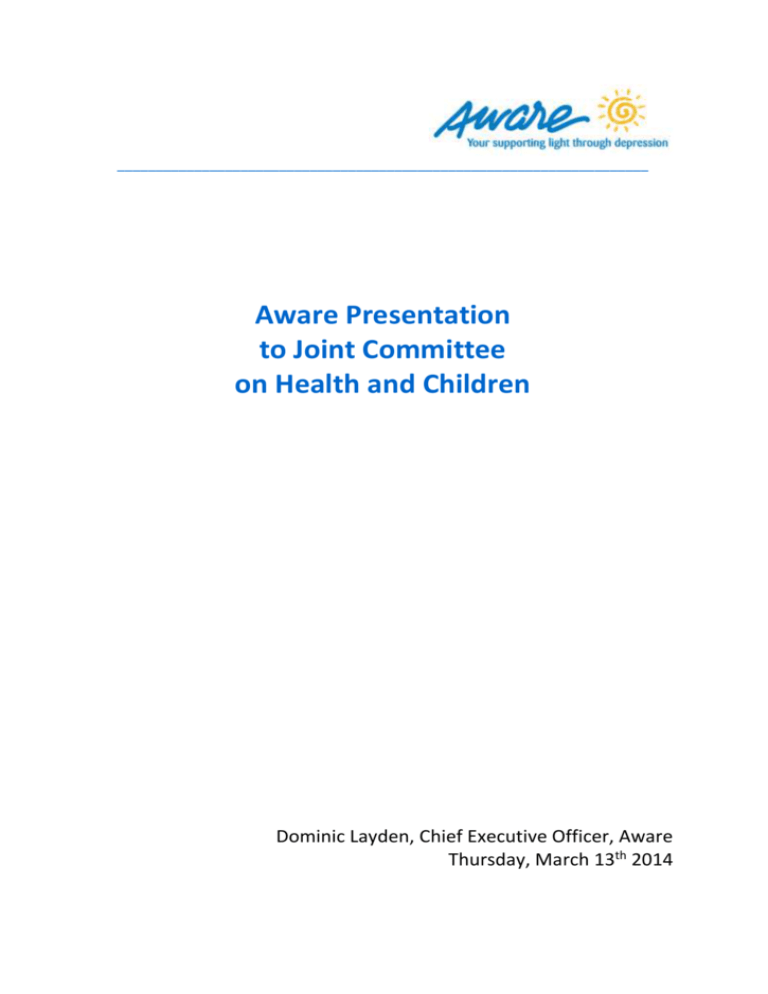
_____________________________________________________________________ Aware Presentation to Joint Committee on Health and Children Dominic Layden, Chief Executive Officer, Aware Thursday, March 13th 2014 Introduction Thank you to the Chairman and Committee members for the invitation and opportunity to present here today, on what is a key issue in Ireland. In this country, mental health supports and services are provided by: → State/HSE → Community and voluntary sector An omnibus survey conducted by Amárach in February this year showed that Aware is the organisation most widely spontaneously associated with depression and mental ill health in Ireland (31%), followed closely by the Samaritans (28%). A wide range of other organisations were recalled though these were mentioned at significantly lower levels, including the State/HSE (12%). This points to the fact that when it comes to mental health, people think of Aware and the Samaritans before they think of the State/HSE. Why do people think of Aware? Aware has longevity, trust and strong brand awareness. The organisation was founded in 1985 by Dr. Patrick McKeon. All services are independently evaluated, a decision made by the Board of Directors in 2011 to ensure quality, best practice and efficacy. This is something that sets us apart from other agencies, and it is what the public rightly expects. While it was a challenge, this was something which everyone in the organisation committed to. Aware has clinical expertise with a Clinical sub-committee of the Board as well as a Clinical Director who was appointed in 2011. We have a very strong and committed volunteer base nationwide. More than 345 active volunteers involved in service delivery have each received a minimum ten hours training each. Aware has developed a range of volunteer policies and procedures to ensure consistency and standards, and has a dedicated full-time Training & Recruitment Officer. Aware also complies with Children First Guidelines and other relevant policies. The services are managed by a small, qualified staff and delivered by professional trainers and trained volunteers. All services are regularly checked for quality and consistency of delivery. 2 People come to Aware for information, for support, for education and for workplace training programmes. INFORMATION Website: Our website gets about 260,000 unique visitors, p.a. – meaning that approx. every two minutes someone visits the site for information on depression and our services. Lectures: Aware offers a monthly lecture series in Dublin, with guest speakers addressing various relevant aspects of mental health. Since making these lectures available to watch or listen back online in June 2012, there have been 39,000 views. SUPPORT Helpline: 50,000+ calls in past three years. Email: 5,000+ emails since service launched in 2011. The service is encrypted which means that volunteers never see the person’s email address, and each response is second-read by a trained volunteer. Support Groups: 45 locations nationwide, each week. Many people are alive today because of these weekly support groups. EDUCATION Beat the Blues [Students aged 15-18]: A positive mental health schools programme delivered to 60,000+ senior-cycle secondary school students in the past two years. This programme helps young people learn coping skills for dealing with concerns, as well as tips for looking after mental health and building resilience. The programme complies with the Government’s Guidelines for Mental Health Promotion and Suicide Prevention (2013). Life Skills Group [Adults 18+]: Delivered in groups of up to 25 people, over 6 weekly 90-minute sessions and based on the principles of cognitive behavioural therapy (CBT). Launched in May 2012, this programme has now been delivered to 3,000 people across most counties in Ireland, with several more phases planned between now and year end. Independent evaluations of the programme have shown significant improvements in self-reported depression and anxiety (using standardised clinical measures). Crucially, these results are sustained at 12-month follow-up as shown in evaluations by Dr. Katrina Collins (2013). With private one-to-one CBT sessions costing approximately €100 each, the real value of Aware’s programme could be estimated at about €1.8m. 3 As it is also useful as a preventative tool, it is possible that there are some further unknown savings as well, in terms of preventing later-stage treatment/hospitalisation costs. Life Skills Online [Adults 18+]: Life Skills Online offers a unique option for service users to access a programme based on CBT from the comfort of their own home, with the added benefit of encouragement from a trained supporter (similar to ‘personal trainer’ idea in a gym). Launched in 2012, 800 people have so far completed the 8-module programme, and we are currently involved in a randomised controlled trial with Trinity College Dublin and SilverCloud technology company. AT WORK Wellness@Work: Aware recently launched a range of training and education programmes for the workplace. Options include a 45-minute session suitable for all employees, as well as half-day and full-day training programmes for managers and supervisors. Comments on the Rapporteur’s report Aware welcomes the report on suicide by the Rapporteur to this Committee, Senator John Gilroy, and has a number of observations and comments. 1) As referenced in the Report, there are a large number of organisations working in the area of mental health, in addition to the services provided by the State. We welcome the suggestion of a national registry of all organisations working in this area. We believe that such a registry would be helpful for all stakeholders and that in addition, the publishing of information on how and why organisations or projects are funded is important for transparency and accountability. 2) Aware has significant concerns around the use of the word ‘suicide’ and the focus, particularly in media circles, on the issue. Suicide has become an everyday word and to a vulnerable person, particularly a younger person, this common, almost casual, manner of speaking about such a serious issue can mean that suicide is in some way perceived as a real option in life. Aware would also like people to understand that just because someone has thoughts of taking his/her own life does not mean the person has to do it – there are always alternative options; and also, just because someone has depression, it does not mean that he/she will inevitably take his/her own life – many, many people experience depression and go on to recover. 4 3) The recession over the last number of years has made many people feel more vulnerable: There have been continuing conversations about austerity, a sense that there will be many years of battle before things begin to show signs of recovery. There is a real need for people to understand things they can do to maintain their mental health in the face of such challenges, and how to build and develop resilience so as to lessen the impact on their mental wellbeing. 4) Alcohol is a significant factor in mental health but there seems to be a reluctance to acknowledge this. The Rapporteur has included detail in his report about the link seen between the increase in the suicide rate in the late ‘90’s and the increase in per capita alcohol consumption rate. Research commissioned by Aware in 2004, and carried out by Dr. Conor Farren, noted that in Ireland, unique among European countries, there was a 41 % increase in alcohol consumption per head of population over the 10 years to 2000, and this mirrored a parallel increase in the national suicide rate. Research from the National Suicide Research Foundation (NSRF, 2013), reported that consistently for the past five years, there were peaks in the number of people presenting at A&E departments, having self-harmed, after consuming alcohol over public holidays. The study showed that the average number of self-harm presentations per day is 33, but this rises to 50+ on key public holidays. 5) In addition to services which focus on helping people who are in acute suicidal crisis, there is also a real need and requirement for everyone in the country to understand that ‘suicide prevention’ is not just about those acute crisis situations; it begins at a much earlier point in the journey and if this is understood and acted on, so many lives and so much distress can be prevented. If we look at how cancer is dealt with: people are encouraged to check themselves regularly for symptoms of some of the more common types of cancer, e.g. breast cancer, testicular cancer. There are also a number of screening options which people are actively encouraged to take advantage of, e.g. cervical cancer screenings. These seem to be showing real results in terms of identifying people who are at risk at an earlier stage, and improving outcomes. Aware is trying to encourage people to take more responsibility for their mental health and monitor how they are doing through its positive mental health programmes: helping people to understand that mental health is something that we 5 all have, and that there are ways that we can look after it and so help prevent issues from developing. Recommendation for Action 1) Education is the key to bringing about a fundamental shift in Irish society’s attitude to mental health, and ultimately suicide. Aware has delivered its Beat the Blues positive mental health programme to 60,000+ senior-cycle students in over half of the secondary schools in Ireland in the past two years. We recommend the State and Dept. of Education encourage all secondary schools to avail of this free programme, as there is nothing else there for young students at this pivotal stage in their lives. We also recommend that mental health education and resilience development should be part of the curriculum, including at primary level. We should all aspire to create a ‘well’ society with young men and women who are resilient and adaptable no matter what the challenges they face. Thank you for your time. Governance: Further Information Aware is governed by a voluntary Board of Directors and is independently audited each year with annual accounts published. 60% of board members have been recruited since 2011. With income of €2.2m in 2013, Aware relies on corporate and public donations as well as fundraising events for 92% of its annual funding. Only 8% of our funding is provided by the State. Aware currently receives no funding from the National Office of Suicide Prevention. Seven per cent of Aware’s income goes to administration costs. No-one in the organisation earns more than €90,000 p.a. Aware adheres to the ICTR Fundraising Guidelines. All of this information is available on aware.ie 6

